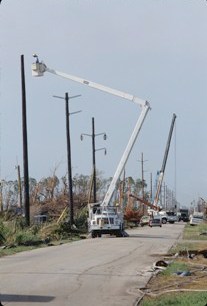
On Aug. 24, Florida and the nation will observe the 20th anniversary of Hurricane Andrew, one of the most dramatic and devastating natural disasters in modern history. For those who lived through the storm and witnessed its incredible destruction first hand, this month is a time of solemn remembrance. And for everyone across the state of Florida and all along the Eastern seaboard and the Gulf Coast, Andrew’s anniversary is an occasion to learn from the past and to recognize the unpredictable and powerful nature of hurricanes, along with the absolute necessity of good planning and preparation throughout every hurricane season.
When Andrew struck just south of Miami, it made landfall with peak sustained winds of 165 miles per hour, and gusts of up to 175 mph. Now classified as a rare Category 5, the hurricane pushed a massive storm surge up Biscayne Bay, and delivered more than 7 inches of rain along the core of its path. Damages from the storm totaled more than $25 billion dollars throughout the Bahamas, Florida and the Gulf states, with thousands of homes lost and many more damaged.
FPL’s storm preparedness and recovery processes were also significantly challenged by Hurricane Andrew. As crews worked feverishly to restore power after the storm, FPL developed and perfected some of the systems now in place to map storm damage and to estimate restoration times.
“At FPL, hurricane preparation is now part of our daily operations, every day we’re not in a storm we’re preparing for one. On this anniversary, we urge our customers to prioritize disaster planning too,” said Keith Hardy, FPL’s vice president of Distribution. “We are always working to help the communities we serve prepare for the next storm. Every year we make multi-million dollar investments in our infrastructure to make it more resilient.”
In the past two decades, advances in technology have changed every step in the hurricane preparation and recovery process. New forecasting tools allow for more frequent assessments of a storm’s path and intensity, and better computer modeling has improved accuracy, especially on the intensity front. At the same time, technology has altered the way that information is communicated – before, during and after a hurricane. Today, storms can be tracked on-line, on mobile devices, through social media outlets, and of course through traditional media sources.
“In the past twenty years, our ability to respond to hurricanes and to keep our customers informed of our progress has improved dramatically with the advent of advanced technologies, and FPL is working to bring new tools to the forefront every day,” said Hardy.
FPL has harnessed technology to enhance the way that it communicates with customers before and after hurricanes, and the way that it pre-positions restoration crews and models the damage to its system from a storm. To help with preparation, FPL offers customers a wealth of information and tips on its website, www.FPL.com. After a hurricane, FPL offers constant updates and information about the power restoration process through its website, which is mobile friendly, and through Twitter (www.twitter.com/insideFPL), Facebook (www.facebook.com/FPLconnect) and YouTube (www.youtube.com/FPL). FPL’s blog (www.FPLblog.com) is also an important source of news.
Technology advancements also allow FPL to inform customers about the post-storm restoration process faster. For example, hours after a storm, a preliminary restoration estimate is created through computer modeling based on historical data. It will change as damage reports from the field are complete, but it’s intended to help customers and communities make initial plans. At the same time, technology gives FPL the ability to streamline and shorten the restoration process by providing real-time location of crews and crew movements through a super-GPS technology called Restoration Spatial View.
“But the fact is, while much has changed since Andrew reached our shores,” said Hardy, “one simple truth remains the same: hurricanes carry with them a potentially overwhelming destructive power, and when a major storm hits, power will be interrupted, trees will fall and water will rise. Floridians must understand this fact and make every preparation for it.”